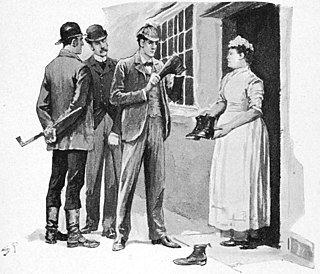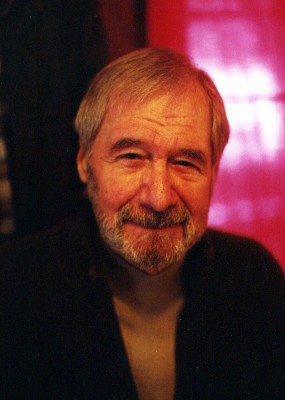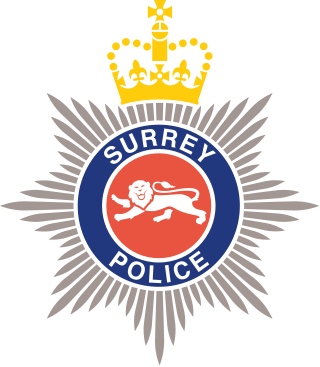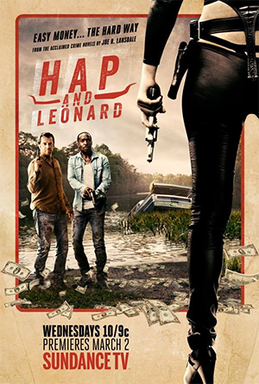Related Research Articles

Detective fiction is a subgenre of crime fiction and mystery fiction in which an investigator or a detective—whether professional, amateur or retired—investigates a crime, often murder. The detective genre began around the same time as speculative fiction and other genre fiction in the mid-nineteenth century and has remained extremely popular, particularly in novels. Some of the most famous heroes of detective fiction include C. Auguste Dupin, Sherlock Holmes, Kogoro Akechi, and Hercule Poirot. Juvenile stories featuring The Hardy Boys, Nancy Drew, and The Boxcar Children have also remained in print for several decades.

Crime fiction, detective story, murder mystery, mystery novel, and police novel are terms used to describe narratives that centre on criminal acts and especially on the investigation, either by an amateur or a professional detective, of a crime, often a murder. Most crime drama focuses on criminal investigation and does not feature the courtroom. Suspense and mystery are key elements that are nearly ubiquitous to the genre.

Evan Hunter was an American author of crime and mystery fiction. He is best known as the author of 87th Precinct novels, published under the pen name Ed McBain, which are considered staples of police procedural genre.
The police procedural, police show, or police crime drama is a subgenre of procedural drama and detective fiction that emphasises the investigative procedure of police officers, police detectives, or law enforcement agencies as the protagonists, as contrasted with other genres that focus on non-police investigators such as private investigators.

Michael Joseph Connelly is an American author of detective novels and other crime fiction, notably those featuring LAPD Detective Hieronymus "Harry" Bosch and criminal defense attorney Mickey Haller. Connelly is the bestselling author of 38 novels and one work of non-fiction, with over 74 million copies of his books sold worldwide and translated into 40 languages. His first novel, The Black Echo, won the Mystery Writers of America Edgar Award for Best First Novel in 1992. In 2002, Clint Eastwood directed and starred in the movie adaptation of Connelly's 1997 novel, Blood Work. In March 2011, the movie adaptation of Connelly's novel The Lincoln Lawyer starred Matthew McConaughey as Mickey Haller. Connelly was the President of the Mystery Writers of America from 2003 to 2004.

Harry Hole, who is also called "Harry Holy" by allies in the Australian police force, is the main character in a series of crime novels written by Norwegian author Jo Nesbø. The name is derived from Old Norse Hólar, the plural form of hóll, meaning "round and isolated hill." Harry's surname is also the name of a historic Norwegian town with a heritage that goes back to the Viking Age.

An Unsuitable Job for a Woman is the title of a detective novel by English writer P. D. James and of a TV series of four dramas developed from that novel. It was published by Faber and Faber in the UK in 1972 and by Charles Scribner's Sons in the US.
Les Norton is the protagonist in a series of fiction books written by Australian author Robert G. Barrett.

Surrey Police is the territorial police force responsible for policing the county of Surrey in South East England.
"The Target" is the series premiere of the HBO original series The Wire. The episode was written by David Simon from a story by Simon and Ed Burns and was directed by Clark Johnson. It originally aired on June 2, 2002. The title refers to Detective Jimmy McNulty setting his sights on Stringer Bell and Avon Barksdale's drug-dealing organization as the target of an investigation.

Metropolitan Division, commonly referred to as Metro Division or just Metro, is an elite division of the Los Angeles Police Department (LAPD) under its Special Operations Group. Metropolitan Division is responsible for managing the LAPD's specialized crime suppression, K-9, mounted, and SWAT units, named "platoons".

Sharman is a British television crime drama series, based on the Nick Sharman books by London-based author Mark Timlin, that first broadcast on 5 April 1995. Broadcast on ITV, the series stars Clive Owen in the title role of Sharman, a private detective operating out of a private office in South London. The series began in the form of a pilot, based on the novel The Turnaround, before being developed into four further feature-length stories, each based upon one of Timlin's novels; only the final episode, "Pretend We're Dead", differs from the plot of the original novel; aside from the final scene, the remainder of the plot is an original composition by writer Mick Ford.

"Son of a Gun" is the third episode of the first season of the American police drama television series Homicide: Life on the Street. It originally aired on NBC in the United States on February 10, 1993. The teleplay was written by James Yoshimura based on a story by executive producer Tom Fontana, and the episode was directed by Nick Gomez. In the episode, recurring character Officer Thormann is shot while on duty, and his close friend Crosetti takes the investigation personally.

Mystery is a 1990 novel by American author Peter Straub, the second installment in Straub's loosely connected "Blue Rose Trilogy". The novel falls into the genre of crime fiction, and was preceded by Koko and followed by The Throat. The book was published by Dutton, won the 1993 Bram Stoker Award and was a 1994 WFA nominee

Bitter Blood: A True Story of Southern Family Pride, Madness, and Multiple Murder (1988) is a non-fiction crime tragedy written by American author Jerry Bledsoe that reached #1 on the New York Times bestseller list. Bitter Blood is composed of various newspaper articles and personal eyewitness accounts of several homicides in 1984 and 1985. The setting for the majority of the book is Rockingham County and Guilford County in rural North Carolina.

Hap and Leonard are two fictional amateur investigators and adventurers created by American author Joe R. Lansdale. They are the main characters in a series of twelve novels, four novellas, and three collections of stories and excerpts. They are two very different men and the best of friends, and now work together as private investigators for Hap's girlfriend Brett Sawyer. Together they always wind up in a lot of trouble with various criminal types in the fictional town of LaBorde, in East Texas and often find themselves attempting to solve various unpleasant and brutal crimes. Both men are well versed in the martial arts. The novels were adapted into a 2016–2018 TV series, produced by SundanceTV. The duo were partially inspired by The Hardman series by the late Ralph Dennis.
The Kenyatta series is a four-volume urban fiction series by American author Donald Goines under the pseudonym of Al C. Clark. Goines released the books under a pseudonym on the request of his publisher, who wanted to avoid flooding the market with too many books under Goines's name and potentially undermining sales as well as to differentiate the books from Goines's "grittier" urban fiction novels.
Cormoran Strike is a series of crime fiction novels written by British author J. K. Rowling under the pseudonym Robert Galbraith. The story chronicles the cases of the fictional British private detective Cormoran Strike and his partner Robin Ellacott. Seven novels have so far been published in a planned series of ten. The seventh novel, titled The Running Grave, was released on 26 September 2023. As of February 2024, the series has sold more than 20 million copies worldwide and was published in more than 50 countries, being translated into 43 languages.
Jack Reacher is a series of novels, novellas and short stories by British author Jim Grant under the pen name Lee Child. As of January 2022, the series includes 28 books and a short story collection. The book series chronicles the adventures of Jack Reacher, a former major in the United States Army Military Police Corps now a drifter, roaming the United States taking odd jobs and investigating suspicious and frequently dangerous situations, some of which are of a personal nature. The Reacher series has maintained a schedule of one book per year, except for 2010, when two installments were published.

Law enforcement authorities fatally shot Winston Boogie Smith Jr., a 32-year-old black American man, in the Uptown area of Minneapolis at 2:08 p.m. CDT on June 3, 2021. Smith was being pursued by a U.S. Marshals Service task force that apprehends wanted fugitives. The arrest operation had the participation of undercover agents from several local police agencies in Minnesota. The officers did not use body cameras or dashcams when apprehending Smith. Controversy over the lack of law enforcement footage of the arrest operation led to local police agencies ceasing aid to the Marshals Service's fugitive task force, and to changes to body and dash camera policies by the Marshals and other federal law enforcement agencies.
References
- ↑ "101 Best TV Crime Series". www.crimeseries.tv. Archived from the original on 24 March 2011. Retrieved 14 January 2022.
- 1 2 "The world of Nick Sharman". Archived from the original on 21 June 2007. Retrieved 9 June 2011.
- 1 2 "Archived copy" (PDF). Archived from the original (PDF) on 8 October 2011. Retrieved 9 June 2011.
{{cite web}}: CS1 maint: archived copy as title (link) - ↑ "Archived copy" (PDF). Archived from the original (PDF) on 8 October 2011. Retrieved 9 June 2011.
{{cite web}}: CS1 maint: archived copy as title (link) - ↑ "Archived copy" (PDF). Archived from the original (PDF) on 8 October 2011. Retrieved 9 June 2011.
{{cite web}}: CS1 maint: archived copy as title (link) - ↑ "About the Author" preface to 101 Best TV Crime Series
- ↑ The Independent, 15 September 1995
- ↑ "Mark Timlin - Nick Sharman: The Rise, Fall and Ultimate Triumph of a Pulp Legend by Peter Walker". Archived from the original on 27 September 2011. Retrieved 9 June 2011.